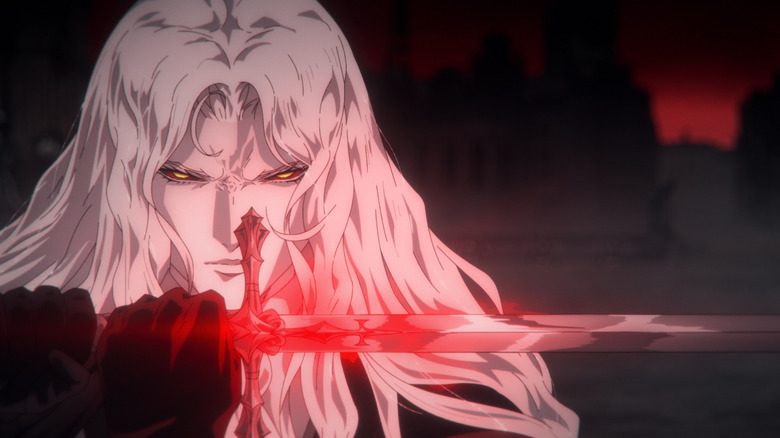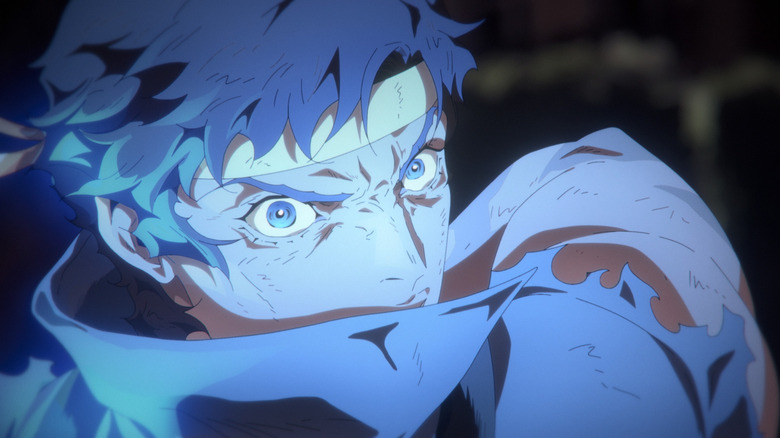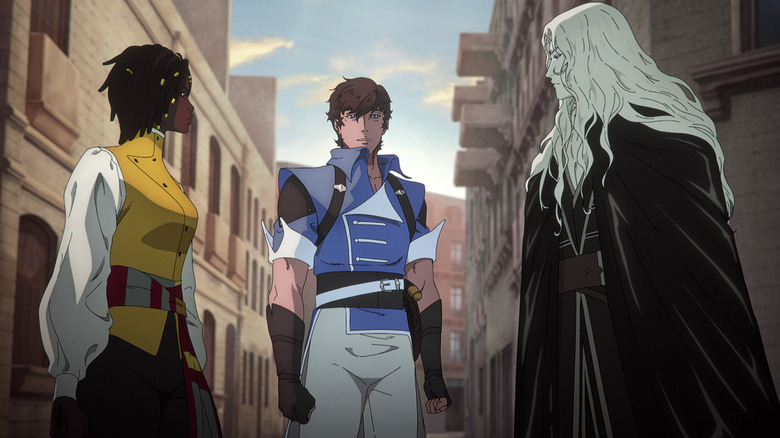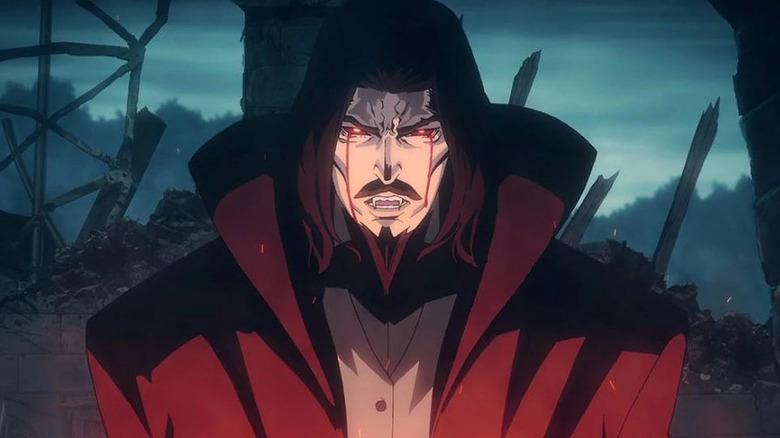How Castlevania: Nocturne Season 2 Sets Up A Symphony Of The Night Adaptation Next
This article contains spoilers for "Castlevania: Nocturne" season 2.
If you count both shows as one, Netflix's "Castlevania" franchise has been running for six seasons and eight years, with "Castlevania: Nocturne" season 2 marking the latest entry in the stylish video game adaptation from Powerhouse Animation. And yet, in all that time, the shows have left the most beloved and critically acclaimed "Castlevania" game untouched. "Castlevania: Symphony of the Night" completely reinvented the property when it dropped on the original PlayStation and Sega Saturn back in 1997. Now, with the way things wrap up at the end of "Nocturne" season 2, fans could finally be getting a proper adaptation of that legendary game ... assuming the show gets renewed by Netflix.
Writing on X in October 2024, series director Samuel Deats confirmed that the show was "going on hiatus until release and we find out if we're getting renewed," adding, "if you want to see more shows of 'Castlevania' quality, please support S2 when it releases!" Renewal in the modern streaming age is always a dicey proposition, especially at Netflix. That said, "Castlevania" has been far more successful than most at threading the needle. Its longevity is a true anomaly these days, and if Netflix sees fit to keep the story going, "Nocturne" season 3 could be a new highpoint.
The ending of "Castlevania: Nocturne" season 2 concludes a lot of the major storylines begun in season 1, including the terrifying reign of Erzsebet Báthory (Franka Potente), the Sekhmet saga, and the will-they-won't-they dynamic between Richter Belmont (Edward Bluemel) and Annette (Thuso Mbedu). At the same time, certain threads are left intentionally dangling, and they all point to "Symphony of the Night."
What happens in Castlevania: Symphony of the Night?
The first "Castlevania" show is an adaptation of "Castlevania 3" from the original Nintendo Entertainment System, with some additional plot elements borrowed from the PlayStation 2 game "Curse of Darkness." Both games are prequels to the first two games in the franchise. "Nocturne," on the other hand, is a bit more loose when it comes to its source material. Richter Belmont first enters the games in 1993's "Castlevania: Rondo of Blood," in which he fights a resurrected Dracula to rescue his love, Annette. Bringing villains back to life over and over again is a more dicey proposition on TV than it is in video games, though, so "Nocturne" wisely decided to create a new villain for Richter to face in the show.
"Symphony of the Night" takes place five years after "Rondo." In that game, Richter goes missing, and Dracula's castle returns, prompting Alucard (James Callis in the Netflix series) to enter it and investigate. He faces a mind-controlled Richter before once again battling his father, Dracula. Maria Renard (Pixie Davies on the Netflix show) also features prominently.
The biggest barrier to "Nocturne" doing a "Symphony of the Night" storyline in season 3 would be bringing Dracula back into the fold, in part because his Netflix voice actor, Graham McTavish, is pretty busy these days. Richter has a different villain to overcome in the first two seasons of "Nocturne," but his character has still arrived in the same basic place where we find him at the start of "Symphony of the Night."
Castlevania: Nocturne season 3 is ready for Symphony of the Night
A few key pieces have been put in place for "Castlevania: Nocturne" to finally tackle "Symphony of the Night." At the end of season 2, Richter and Annette get together, as they do in the games, and Richter goes off to some other part of the world, which could be prime material for his disappearance arc in the games. Meanwhile, Alucard decides to stay with Maria and Juste Belmont (Iain Glen) in Paris, at least for the time being. That keeps him close to the action, as he's the main character of "Symphony."
The biggest unresolved thread in season 2 is the mysterious specter looming in the background — a figure Olrox (Zahn McClarnon) refers to as both "Old Man Coyote" and "Mephistopheles." While not yet confirmed, it's possible that this character is Death (Malcolm McDowell) from "Castlevania" season 4, an ancient being whose physical form is destroyed by Trevor Belmont (Richard Armitage). Death plays a key role in "Symphony of the Night," and his possible presence in "Nocturne" season 2 might be giving us a peek at how the show could bring some of those storylines back.
Obviously, a lot of the "Symphony" plotlines will need to be tweaked for the animated series. For one, the actual action of a "Castlevania" game isn't enough to fill a season, as it's mostly action. Richter's love for Annette could become the thing that pushes him into a vulnerable place, or maybe Maria gets in over her head back in France, prompting a desperate play.
Will Dracula come back in Castlevania: Nocturne?
It's hard to imagine "Castlevania: Symphony of the Night" without Dracula. That's the biggest gap that "Nocturne" needs to fill in to bring the game to life. But while bringing him back at the start of "Nocturne" may have been too much, enough time has passed for the storyline to work now. Dracula hasn't been a primary character in the franchise for four seasons, and it's been hundreds of years in-universe since he was last thought to be alive.
The bigger question is how the show could make him a villain again if he were to return. While Dracula movies usually make him the big bad, by the time he dies in "Castlevania," he's really more of a tragic figure. The final scene of the original "Castlevania" series reveals that Death's attempt to bring Dracula and his wife Lisa (Emily Swallow) back from the dead was successful, but not exactly in the way that he planned. The two return to Earth in their normal bodies and decide to live a quiet life together, letting Alucard believe that they are truly dead so that he can move on. It's unclear if this resurrected Lisa still has a mortal life, but Dracula presumably would still be alive during the events of "Nocturne." However, it's hard to imagine him relishing carnage on Earth again after reuniting with his wife.
Regardless, it feels like we're on the brink. If its predecessor is any indication, "Nocturne" won't run for more than four seasons. You don't choose Richter Belmont as your new protagonist and not plan on adapting "Symphony of the Night," so the time is ripe.
The first two seasons of "Castlevania: Nocturne" are now streaming on Netflix.



